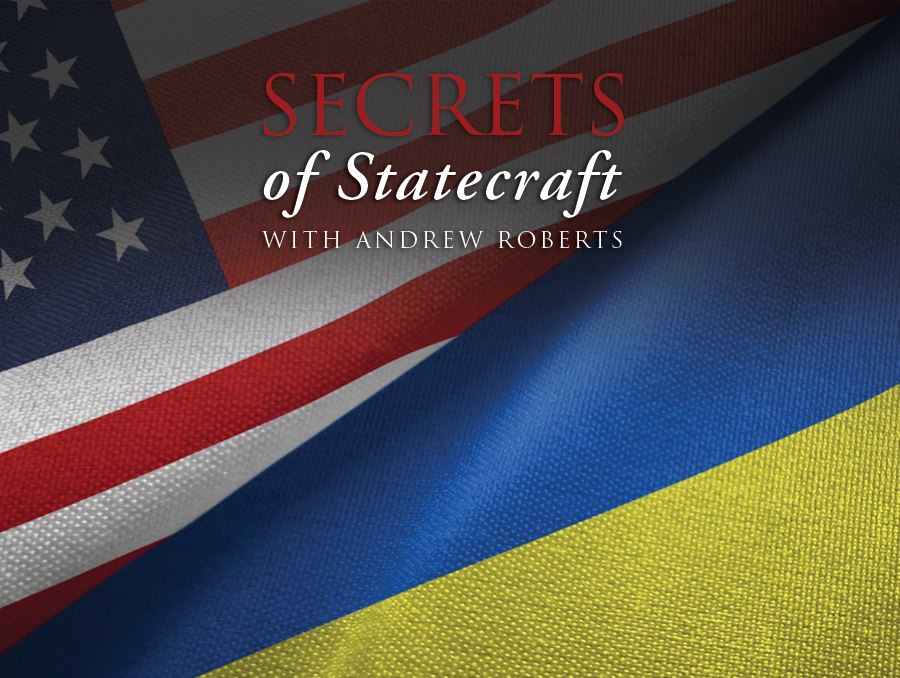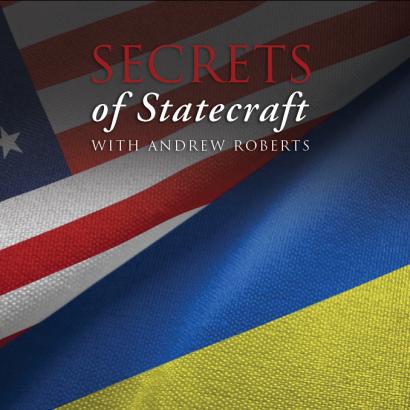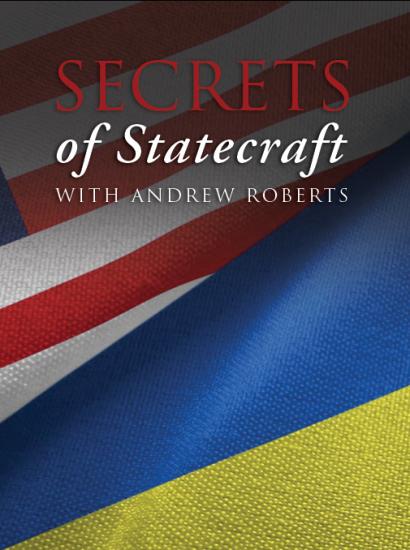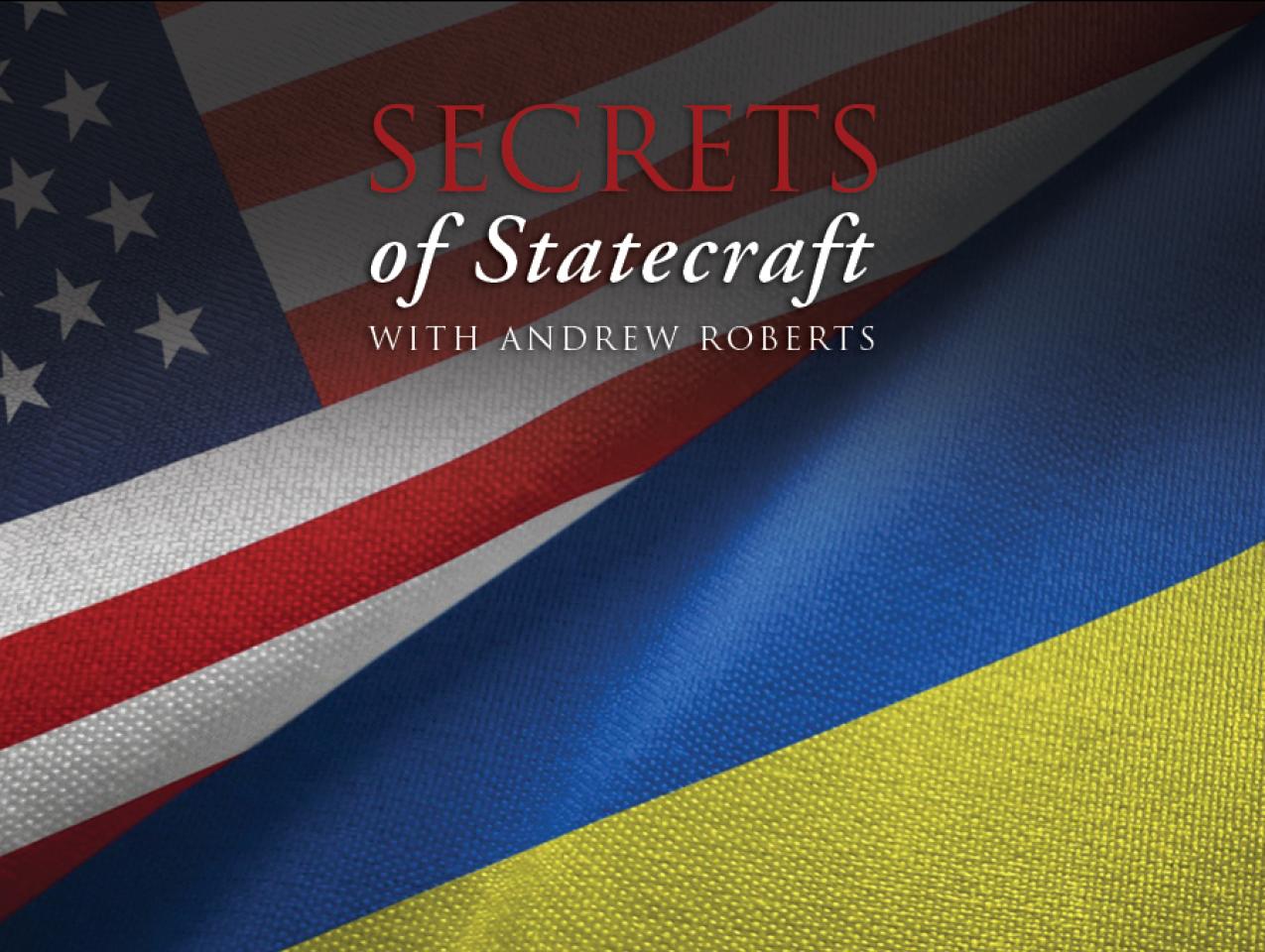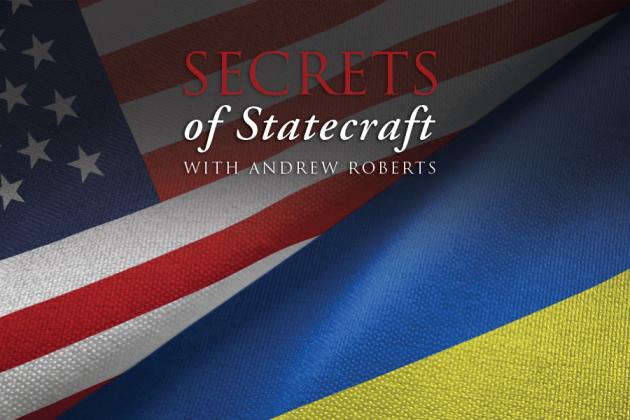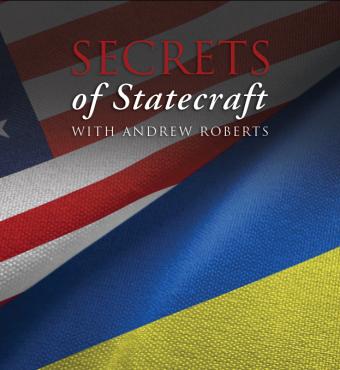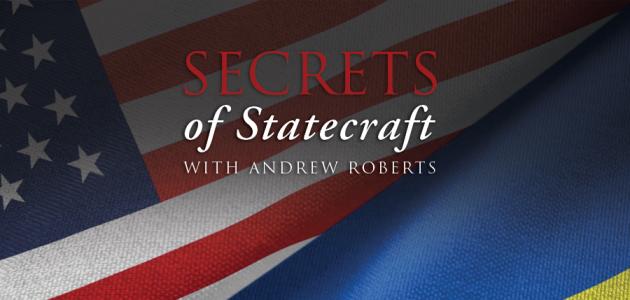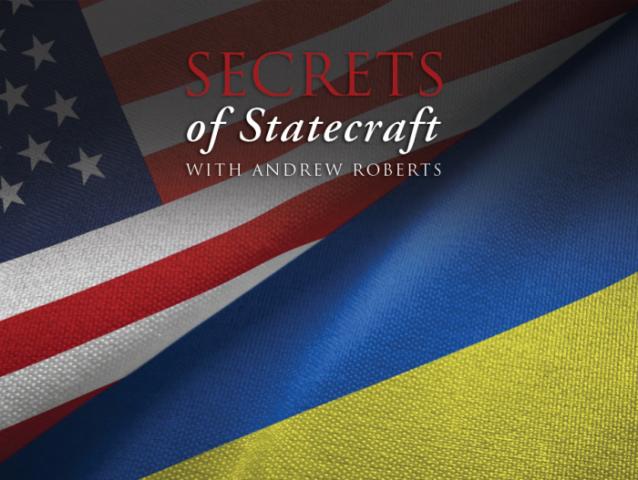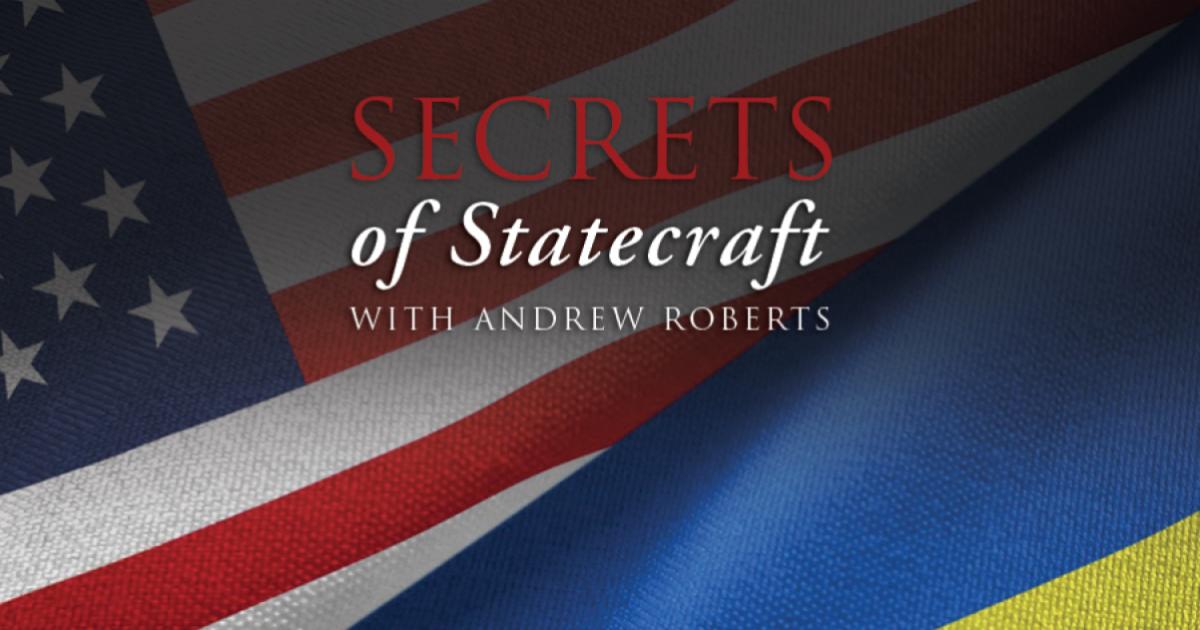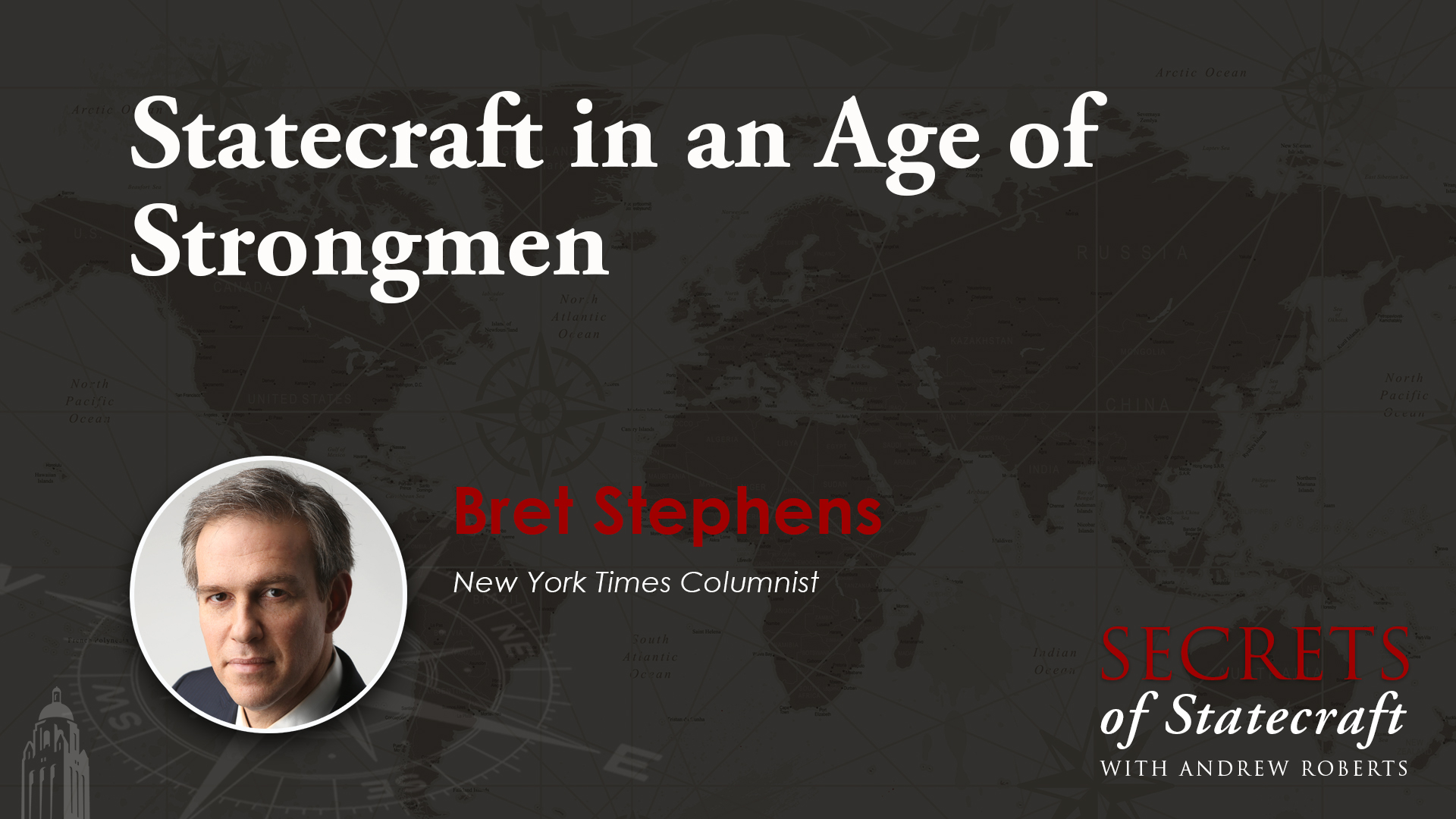- US Foreign Policy
- Determining America's Role in the World
In this unique return visit to Secrets of Statecraft, New York Times columnist Bret Stephens discusses why defending Ukraine is in America’s interest, and reflects on the perils of Western flirtation with authoritarian figures.
Recorded on May 16, 2025.
WATCH THE VIDEO
>> Andrew Roberts: Stephens is a columnist on the New York Times and the founder and editor of the Journal Sapir. Bret, you're the first person to come back onto Secrets of Statecraft. Do you feel properly honored?
>> Bret Stephens: I'm either very honored or you're very desperate.
>> Andrew Roberts: It might be both, needless to say.
Can we start with a couple of articles that you've written for the New York Times in your column and discuss those before talking about what else you're up to at the moment? The first one was the fourth of March. The open brackets, fatuous, close brackets. Case for betraying Ukraine.
You come up with four arguments that are put by the essentially mega Republicans who can't stand Ukraine and have argued. Firstly, let's start off with the first one that, quote, the U.S. is spending billions of dollars for a war in Ukraine that is not in US Vital interests and in which victory is not possible.
What's the answer to that?
>> Bret Stephens: Well, first of all, victory, at least victory of a sort is certainly possible. The Ukrainians demonstrated that in the first year of the war, when they not only were able to stop a Russian advance that was supposed to take all of three days to take Kyiv, but were able to recover a good deal of the territory that they had lost, culminating in their victory in the southern city of Kherson, reclaiming that city.
Unfortunately for the Ukrainians under the Biden administration, they received aid that was almost constantly a case of too little, too late. But if they were able to receive the right quantities of military aid in a timely way, they would be able to further demonstrate the weaknesses of the Russian military establishment.
The idea historically that smaller powers can't defeat much larger powers or larger powers with nuclear power, nuclear weapons is simply defied by decades of military experience in which supposedly inferior powers were in fact able to prevail, or at least prevail sufficiently to maintain their sovereignty and their core interests.
So that argument that Russia is just gonna grind on forever seems to me exceptionally weak.
>> Andrew Roberts: And the line about that it's not in US Vital interests, I don't know.
>> Bret Stephens: How it's not in a vital interest of the United States to see one of our two primary geopolitical competitors or adversaries, have its military decimated not by us but by an allied state.
It seems like an extraordinarily good investment for the United States to have the Ukrainian military, with our logistical assistance, our intelligence assistance, but not boots on the ground, do such extraordinary damage to a hostile regime which threatens our vital interests around the world.
>> Andrew Roberts: Well, the argument against that is One that you yourself obviously put in this article where you say that U.S. strategic and foreign policy concern is competition with China and hostility to Russia consolidates the Russian Chinese axis.
What's the argument to that question you've essentially put against yourself in this article?
>> Bret Stephens: Well, I wanted to offer the opposing side the most sophisticated version of their own argument. Sometimes an argument they're not capable of summoning themselves. But as we know from World War II, we don't have the benefit of choosing our enemies and our enemies have motivations which are not only geopolitical but often ideological.
Xi Jinping and Vladimir Putin have recognized one another as birds of a feather for a long period of time. The alliance between Beijing and Moscow, the new alliance, the realiance, if you can use that term, between these two Eurasian powers has been becoming bolder and more deeply entrenched now for over a decade because they see themselves having the same enemies and the same ambitions to revise borders in their respective spheres of influence.
Obviously with Russia it's in Ukraine and wherever else they might strike next, with China it's in Taiwan and the South China Sea. But the fact is that this war has not produced a new Sino Russian alliance. This war is the product of a Sino Russian alliance that was consolidated with this treaty of what was called, I think Limitless Friendship, signed before Russia in fact moved its forces re, invaded or invaded once again Ukraine in February of 22.
>> Andrew Roberts: And, and of course with the 4200 mile border between the two countries, they're of course going, it's going to be impossible for America to offer Russia anything to try and get it to leave a Chinese alliance when the Chinese are always going to be able to bid more than, than the Americans and offer more.
>> Bret Stephens: Exactly. And, also, there's this idea that has the gloss of sophistication that what Trump is trying to engineer is what was called a reverse Nixon, right, that just-
>> Andrew Roberts: That was gonna be my next question because you say in your, in your Devil's Advocate piece you say Nixon and Mao did it.
Why not Trump and Putin? What's the answer to that one?
>> Bret Stephens: Well, I mean when Nixon did it with Mao, Russia and China, or I should say the Soviet Union and China had nearly had three years earlier gone to a full scale thermonuclear war. Their enmity was well established at the time that Nixon went to Beijing in 1972, preceded obviously by Kissinger's diplomacy several months earlier.
So that was already, that divorce had already taken place when Nixon swooped in to to further move China out of Russia's orbit. Also remember, China was emerging from the Cultural Revolution. In fact, it was still in throes of the Cultural Revolution when when Nixon moved in and the Chinese were in a singularly weak position.
So the historical comp simply doesn't work. This. This time around, unfortunately, after historical comparison, you'd have to go back to the 1930s, in which one dictatorship swoops in to seize territory and other dictatorships take notice and see that the democracies aren't prepared to defend their territories or defend the status quo that they themselves had established.
And so the much more serious fear is, is that a successful outcome for Russia in Ukraine is going to profoundly embolden the Chinese to move on Taiwan at the nearest opportunity. Because they see in the Trump administration a president who is not particularly interested in using American power to defend free countries.
Faced with dictatorial adversaries, the way Truman was when he created the Truman Doctrine and the system of alliances and guarantees at the dawn of the Cold War.
>> Andrew Roberts: Do you think that Trump, faced with an actual Chinese invasion of Taiwan, wouldn't stick up for Taiwan? Would it allow all those important high end semiconductors to fall into Chinese hands?
>> Bret Stephens: Well, my great fear is that that's exactly where we're going, in part because Trump is sending signals that he is not especially interested in defending our allies. And when he slaps tariffs on allies almost to the extent that he slaps them on adversaries, that will suggest to the Chinese that he doesn't look at our traditional alliances or our historic commitments in a serious way.
Now they're contending forces, Andrew, within the admin, Marco Rubio, the Secretary of State is certainly much more hawkish until his demotion. So was the national security adviser, Mike Waltz, now pushed aside to go to the United Nations. So I don't want to make absolutely confident predictions about what the Trump administration might do, but my fear is that this administration is sending signals to the Chinese which the Chinese could very easily misread or be tempted by to, to move on Taiwan.
Excuse my. My dog in the background there.
>> Andrew Roberts: Yeah, we love dogs in the background. That always goes down well with the listeners, I can assure you.
>> Bret Stephens: Well, you know, the, you know, and so my fear is that even if Trump is intent on defending Taiwan, that the signals that he's sending would tempt Beijing into a miscalculation that would then be ruinous for both sides in terms of its costs.
>> Andrew Roberts: There's another point you made about the payback with regard to the critical minerals of Ukraine. Do you think it's fair for the United States to use this moment to try to claw back however many billions it's given in military aid through forcing Zelensky to sign a critical millennials deal?
>> Bret Stephens: Look, I think it's an incredibly crass piece of mercantilist foreign policy. The payback that we're getting from the Ukrainians is that tens of thousands of Ukrainians have given their lives not only to defend their own sovereignty and their own freedom and independence, but really the freedom of other NATO countries, including ultimately the United States.
That being said, if the price for continued American support is this minerals agreement, if it does consolidate an American interest, at least in the minds of this administration, in defending Ukraine against invasion, then that's, I think, a price that's worth paying. I can't imagine a Harry Truman or a Ronald Reagan demanding those kinds of concessions because the best forms of agreements, the best agreements are freely arrived at.
But if that's what has to be done to keep Trump at least minimally interested in defending Ukraine's sovereignty against Russia, then so be it.
>> Andrew Roberts: And actually fdr, you could add on to that, of course, because the Lend Lease deal was something that was, as Churchill called it, the most unsorted act.
It wasn't until 2014 that Britain finally paid off its debts to you over Lend Lease. And of course we needed those weapons to fight the Nazis. I mean, that was a truly generous and splendid moment. The idea that FDR might have tried to gouge out British mineral wealth whilst the war was still going on is essentially the kind of thing that we're getting from President Trump.
>> Bret Stephens: And also FDR came from a generation that learned the lesson from the First World War that trying to gouge out militarily and financially bankrupted allies for the sake of American support was going to be a, a recipe for diplomatic failure in, in, in the future. So that the generous policy, the altruistic policy that FDR embarked on was, was self interest properly understood, or an enlightened self interest because it consolidated trust between the two sides of the Atlantic, the two sides of the free world of the Atlantic.
And through that trust gave the United States extraordinary access to European markets. It gave us extraordinary, an extraordinary place in global security, a guaranteed state of hegemony. Because Europeans understood at least then that the United States was a reliable and generous and fair-minded partner. That that understanding is fraying by the minute today.
>> Andrew Roberts: What, what do you think about the argument that you also sometimes get from MAGA Republicans that if Russia can't defeat Ukraine, then obviously it poses no threat to Europe. If it is not capable of crushing Ukraine and it's, and it's lost what, 40% or so of its tank fleet, then the prospect of any r attack on a NATO country is, is minimal.
>> Bret Stephens: Yeah, maybe in the next six months or even in the next few years. But the time horizons of not just Vladimir Putin, but this, this regime are much longer. And we know from history that aggrieved or ambitious or revanchist powers are capable of rapidly regenerating military force.
I mean, German spent and starved force in 1918 and within 20 years was on the eve of conquering almost all of Europe. So if you choose to look at a very short time horizon, that argument holds some sway. But if you look at what the defeat in Ukraine would do to embolden Putin.
And to then set his sights elsewhere, whether it's in two years or five or five years or more, then we should be worried. I mean we need to construct a policy that's going to last more than just a couple of years.
>> Andrew Roberts: We have an article, you wrote an article on 22nd of April, the face plant President.
I had to look up face plants. We don't have the same expression.
>> Bret Stephens: It's an expression you need teenage children in America to-
>> Andrew Roberts: Got it. I wondered whether or not it was a sporting expression because very often, you know, they are in American English. But let's talk about some of the subjects that you raised in that.
Firstly, what's going on at the Pentagon, can you make sense of it for my listeners on earth is happening around there?
>> Bret Stephens: Well, you have a, a leader in the Pentagon, Pete Heth, who other than his honorable military service as an Army Ranger, has no experience whatsoever running a military.
His predecessor, Lloyd Austin, you say what you will about him, had and was in fact a four star general before he, he became of defense. So he had dealt with the larger issues of the United States army and the United States military. Texas entire experience really came down to being a commentator on Fox News.
So one aspect at work here is shocking level of inexperience compounded by an astounding level of incompetence and carelessness. I think the whole world knows about this in terms of his sharing of national security sensitive national security information, if not outright secrets on that signal chat that was then also shared with a journalist from the editor of the Atlantic Monthly.
All of this is happening, by the way, at a moment when there is a broad recognition that the Pentagon has to learn to do business in a different way, has to acquire weapons systems in a different way, has to rear its outlook. In fact, one of the, one of the, I don't know if the word blessing is, but one of the benefits of the war in Ukraine is that it has taught us that the way of war moving forward is going to look very, very different from what we saw in the past and the armaments that we've built for conflicts we may no longer likely be fighting.
So we need a genuine revolution in military affairs. That's, that's well understood, but it's being led by perhaps the least competent person I can imagine to, to engineer that, that revolution. And so that is I think what we have here. And it's, it's genuinely worrisome. I think we're in a moment where the geopolitical inflection point I wasn't a fan of the previous president, but he was right.
Joe Biden was right when he called the 2000 and twenties a decisive decade. And here we are when we need the best possible talent, a kind of a David Petraeus figure at the helm of the Pentagon, someone who really thinks deeply about these issues. And that's not what we have.
>> Andrew Roberts: One of the things in Europe that we find difficult to work out is how often President Trump should be taken seriously and literally. You have the remarks about Canada and Greenland and Panama which seem to threaten annexation. You have the threat to fire Jerome Powell. Talk about third term of his presidency.
How much of this is just said purely in order to cause a stir, irritate opponents and its sort of policy by press conference essentially. Or how much do you actually feel that he, he truly believes these things?
>> Bret Stephens: Well, I think he sort of believes these things and he's going to, I think he, his motivations are several.
First of all, I think he enjoys the, the consternation that he causes. Secondly, I think he'd be delighted if Denmark were to somehow cede Greenland to the United States or if Canada were to suddenly wake up tomorrow and say, you know what, we really, we really want to be the 51st state.
But the real problem is whether he's serious or not is almost beside. The question is that he creates a kind of non stop sense of alarm and qualities of unpredictability which ill serve the United States. I mean, it's, you have to remember that in his heart, Andrew, Donald Trump is a reality TV star.
It is the one thing at which he was truly successful. You'll recall that right after the end of that Zelensky meeting, that horrendous Zelensky meeting, he said his last comment before the cameras clicked off is this is going to make for great tv. That's what he's sort of doing.
He's making, he's creating a TV drama every single day. And people watch in some mixture of horror, bemusement, delight, and they're curious to see what happens next. That is, that is perhaps the best way to understand who Donald Trump at bottom is on the basis that the.
>> Andrew Roberts: The stop clock is right twice a day.
Is there anything he's got right over the last hundred days?
>> Bret Stephens: Many things. And I think it's important for those of us who are his relentless critics to acknowledge we had a very serious crisis at our southern border. We had effectively open borders for the four years of the Biden presidency or at least three and a half years until Biden demonstrated that an executive order could solve a problem that he had just allowed to fester for, for years.
Now, you can argue with the methods that he's used, but countries require defended borders and immigration systems need to be regularized, need to be lawful, or people will lose trust in a government's ability to perform its most basic functions. I think his order to try to eliminate what is called dei, the diversity, equity and inclusion efforts, which were.
A perverse form of racial gerrymandering, totally at odds with the spirit of civil rights and equal opportunities. I think that was absolutely valuable. You know, at the Pentagon, there really was a problem in that all of the senior ranks. Seem to have been filled by the Biden administration with DEI hires.
Some of these were, I think, capable hires, others not so capable. And the criteria for selecting senior officers was, I think, perverted by considerations of race and gender rather than mere consider, you know, clear, straightforward considerations of merit. So these are things that I think have some value, but they're overwhelmed by the chaotic and shambolic and often exceptionally destructive ways in which Trump has gone about the presidency.
And I think none is worse in my view, than the imposition, the helter skelter imposition of tariffs, which has damaged our standing and credibility in the world, which has undermined an economic order built successfully over 80 years, which is hurting and in some cases destroying American businesses. For what gain, I can't perceive it except a kind of an ideological ide fix, that somehow we're going to recover the economy of 1950s America when manufacturing here was resilient and reliable.
It's a backward looking vision of the economy which is going to do a lot of damage if he pursues it.
>> Andrew Roberts: And as you pointed out in that article, China's capacity both to absorb and impose economic pain vastly exceeds Washington's. I mean, that's true of totalitarian powers, full stop against democratic powers, isn't that.
>> Bret Stephens: Well, that's exactly it. And you see it in the now sudden rollback of sudden of some of these, these tariffs. Now this is the thing about a regime like China. Xi Jinping does not mind a guy who locked down entire cities like Beijing for the propagandistic aims of showing that China was somehow immune to.
COVID 19 is not going to worry too much about imposing vast economic pain over his people, at least for a period of time, in a showdown with the American president. Because this is as much about prestige as, as it is about economic logic. And that's again something I fear that this administration simply doesn't understand.
Don't pick fights that you're not going to win. It's basic in life.
>> Andrew Roberts: I suppose another area that Trump has got things right was the protecting women's sports from transgender people who claim to be women and are obviously much stronger and faster and, and, and tougher. That's another area, isn't it, where he can be patted on the back?
>> Bret Stephens: Yes, it is, and I agree with it. Although it doesn't exactly rank in sort of my list of, you know, the,
>> Andrew Roberts: The Abraham Accords.
>> Bret Stephens: I don't, I also don't want, I don't want biological males or whatever you want to say, transgender women.
>> Andrew Roberts: Yeah.
>> Bret Stephens: To out compete, you know, swimmers on the University of Pennsylvania swim team in a way that is transparently unfair and makes a mockery of the achievements of women's sports.
And that is, by the way, those are. That's the sort of issue which has led the Democratic Party to its disarray today. That became the hostage to highly ideological factions within it that demanded ridiculous things, that imposed ideological purity tests on everything that required people to state their pronouns or expected people to state their pronouns in their email addresses and so on.
Tim Waltz, Kamala Harris's incompetent vice presidential pick, said, you know, during last year, he said something like, well, the Republicans are just weird. I think most Americans looked at the Democratic Party and said, you guys are much weirder. And, and so I hope Democrats have learned the lesson that playing this kind of cultural politics at the behest of the far left in the United States is a recipe for electoral failure.
>> Andrew Roberts: Have you seen any indication that they have learned that lesson?
>> Bret Stephens: Yes. You see people like, I mean, and there's some terrific Democrats who are trying to reclaim the party and bring it out of the jaws of the far left. Seth Moulton in Massachusetts, Harvard graduate who went straight into the Marines after Harvard and had a distinguished military record before he went into Congress, said this right out of the bat right after the election.
He said, I don't want to see my daughters getting run over by, you know, on the playing field, by, by boys, on, on girls teams. He was pilloried by the far left, but it was the sort of comment that brought Democrats back to planet Earth. John Fetterman, the senator from Pennsylvania, has made some of these points when it comes to rejecting the pro Hamas tilt of the progressive wing of the Democratic Party.
Richie Torres, an extraordinary young congressman from, from the Bronx, I think is, is a future leader for the party. I hope he's a future leader for the party because he's on Team Sanity. And too many members of the Democratic Party were afraid to face up to ideologically crazy voices in their midst.
You can't have a party hostage to its, its most extreme and censorious and moralizing faction. And that risk that Democrats have run, of course, it's something also that applies to Republicans.
>> Andrew Roberts: Precisely, and let's talk about that in the next section. What On Earth was JD Vance thinking of praising the AfD in Germany?
>> Bret Stephens: JD is 40 years old. I have a distinct memory of him in 2016, on the eve of that election, appearing on a television show with him and then going for a walk around Columbus Circle in New York where we were both emphatically agreeing that Donald Trump should lose by the widest margin possible to Hillary Clinton because he represented such a danger not only to the country, but to the tenets of a healthy conservative movement.
Of course, here we are eight years or eight, eight and a half years later, and he's Trump's servile vice president. Meeting with the AfD was some combination of extremism and ignorance. A very American parochial view that if the elite people don't like you, you must be a good person, right, or you must be a good party.
So he met with the AfD, I think, with a naivete that was, you know, really shocking. I think Elon Musk paved the way for him by sort of embracing the party. But when you have a party that's too toxic even for the likes of Marine Le Pen, that should tell you something.
When you have a party that is dog whistling old. SS tunes or Nazi slogans. That also should tell you something. I know quite a bit about Germany, and Germans are exceptionally well attuned, certainly educated Germans exceptionally well attuned to slogans that have echoes of the Third Reich. And so what the AfD has been doing has been exceptionally deliberate.
And like other extremist parties, the AfD mixes some positions which are at least reasonable with other positions which are demagogic, extremist, and frightening. And that the vice president of the United States should essentially have embraced them in his disgraceful performance at Munich had echoes of another embrace by another Western leader of another disgraceful party in the same city.
>> Andrew Roberts: In February, the United nations needed to vote on Ukraine's resolution demanding a withdrawal and a just peace, and 93 countries supported that and 65 abstained, including China, and 18 opposed it, including Russia and Belarus and other places, Equatorial guinea, other North Korea, other places that you're dying to live in, I'm sure.
And the United States. What on earth was going on there?
>> Bret Stephens: Yeah, well, it was part and parcel of a policy of appeasement is the only word I can think of. The idea being that somehow, if Trump made gestures that Putin would approve, that Russia would be more amenable to some kind of negotiated peace.
Of course, as with all dictatorships, they just took this as a signal that they were going to get whatever they wanted out of. Out of this administration. And more recently, you've heard the president make some slightly more skeptical noises when it comes to Russia. It reminds me a little bit, or more than a little bit, of Jimmy Carter, who came into the White House talking about how Americans needed to get over their inordinate fear of communism.
And, of course, by the end of that administration, with Russia marching into Afghanistan and the threat of a Russian invasion of Poland, at the time singing a rather different tune. The problem I think we have, though, is somewhat different in that for whatever reasons Donald Trump seems to have, I don't know if this is a term that carries over to Great Britain, but he seems to have a man crush on Vladimir Putin.
And that infatuation, which stretches back many years and has led to a lot of conspiracy theorizing, is nevertheless real and apparent. Putin seems to embody a kind of ideal of confident authoritarianism that Trump admires. Again, unique among American presidents in that sense, and that I can't think of an American president, even those I've disliked, who hasn't had an innate distaste for dictators who poison their own citizens or invade their neighbors, but,
>> Andrew Roberts: Poison British citizens actually, as well, of course.
>> Bret Stephens: Poisoned British citizens with nuclear toxins and other exotic assassination attempts. But Trump's moral universe is different from our own.
>> Andrew Roberts: There was also a vote from another country which has a very different moral universe from Trump's, and one that both of us love and admire, and that's Israel.
Why on earth did they vote in that way?
>> Bret Stephens: It was a shameful vote. It made me sick to my stomach. And it was a vote that came out of, I think, Benjamin Netanyahu's belief that if he presented himself as the most worshipful, admiring, best friend that Donald Trump ever had, that he would have freedom to act that the Biden administration had sharply restricted.
Now, what we're seeing from Trump's latest visit to the Middle east is that by behaving in this toadyish fashion towards Trump, Trump expects even more toadyism and is treating Netanyahu almost accordingly. It was Israel's policy towards on Ukraine, another democracy facing totalitarian neighbors bent on its destruction is a real stain on Israeli foreign policy.
And by the way, as I say this, let the record show that this idea that I, as a proud defender of Israel, simply slavishly defend every decision by the Israeli government is false. It's perfectly possible to strenuously criticize Israeli government policy while being proudly in support of Israel's right to live in freedom and prosperity and without the fear of terror.
>> Andrew Roberts: And one area where Trump is showing complete disregard for Israeli feelings is Syria, isn't it where Trump seems to be offering an olive branch to the new government in Syria in a way that the Israelis have been warning against?
>> Bret Stephens: Well, it was particularly shocking for me listening to Trump say that he has endorsed the government of Shahra, the new Syrian strongman, thanks to the endorsement of his good friend Recep Tayyip Erdogan, an Islamist, anti Semitic, quasi democratic strongman in.
In. In Turkey. I mean, if that's your endorsement, my lord. Now, there is a case to be made that we should cautiously test the Syrian government to see if, in fact, Shara and his government have changed their stripes. Just eight years ago, they were an offshoot of Al Qaeda to see if they're willing to get control over the militias that recently perpetrated a terrible massacre in the coastal city of banyas against some 1600 people, that they aren't going to terrorize the Druze and other religious minorities or ethnic minorities in Syria, and that there was a cautious approach that might have worked.
But instead, you saw Trump doing somewhat what he had done with the North Korean leader in his first term. Kim Jong Un making himself sort of very visibly the center of the diplomatic effort. One of the problems Problems with the Trump administration is that he is always intent on being the center of every story.
Usually what you would do is you would send a deputy under Secretary of State for Middle Eastern affairs to meet with Shara to come to a set of understandings. And the buildup to a meeting with the president would have required Syria to meet certain tests in order for the president not to put his personal credibility on the line.
But again, this is yet another other way in which this administration operates like no other in US History.
>> Andrew Roberts: Where do you think we are? One, one area that, that President Trump certainly was successful in his first term with the Abraham Accords. He obviously wants to extend them.
Where do you think we are with that?
>> Bret Stephens: Look, I, I don't want to. I think the Abraham Accords were not only the most significant diplomatic achievement of the first Trump term, but they were, my view, the most significant US Diplomatic achievement in the Middle east since maybe the Camp David Accords of the late 1970s, the peace between Israel and Egypt.
And I'm concerned that Trump seemed to put to one side, bringing Saudi Arabia and Israel together through a cooperation deal with the United States on nuclear energy, between Saudi Arabia and the US on nuclear energy and other issues, he kind of kicked Israel out of that potential bargain.
If, in fact, Syria does join the Abraham Accords and there is an Israeli embassy in Damascus, that would be an exceptional achievement. And I don't want to rule it out. I just think it's premature given how incomplete our information is about this new government. The great prize is a diplomatic recognition between Israel and and Saudi Arabia.
But I think it's very important to note one more thing, Andrew, which is that the Iranian regime has never been weaker. Has never been weaker. And the war between Israel and Iran is in many ways an unnatural war. The Jewish people and the Persian people, in my view, were natural allies, and they were in the time of the Shah, not simply for having common enemies in between, but for a deep history stretching back 2500 years of cultural entwining.
And I think that if this regime were to go, you would see a tremendous hunger among millions of Iranians to normalize Iran's position in the world on many fronts, including diplomatic ties with the Jewish state. And I don't think if, if that it's out of the question, that when we speak in a year's time, if I become the first person on this.
Podcast three times,
>> Andrew Roberts: I can promise you that. I can promise you that you're doing very well so far in a year.
>> Bret Stephens: Or two, if, in fact events lead to the toppling of the regime to see that as a real possibility. So I say that only because even though it may seem a long shot, I think it's plausible.
And then I, if it comes to pass, I would get to crow that you heard it here first.
>> Andrew Roberts: So do you think that Trump's interaction with Iran over the nuclear bomb, therefore, in some way strengthens the Iranian regime at a time when it should be as weak as possible?
>> Bret Stephens: Well, yes, and it depends, of course, on the terms of the deal being negotiated. Because if we get a reprise of the jcpoa, the Obama administration's exceptionally weak deal with the Iranians on their nuclear portfolio, in exchange for the lifting of sanctions, the Iranians will simply pocket the economic benefits of seeing those sanctions lifted, the relative diplomatic immunity they'll get for at least some period of time, and they will either drive their nuclear program underground, not just literally, but, you know, hide it better, and eventually resume their support for the Houthis and other terrorist proxies with refurbished coffers.
I think that would be a calamity. I'm not against a deal that verifiably ends every aspect of Iran's nuclear programs, including its civilian nuclear programs, but I would be very surprised if that's the deal that Steve Witkoff and this administration are. Are actually negotiating.
>> Andrew Roberts: Which actually brings us on, obviously, to Hamas, who was Oday Al Rubai and why is he important?
>> Bret Stephens: He was a young Palestinian who a few months ago joined courageously a protest by Gazans, the civilian Gazans who have been so brutalized by. By this war to call for an end to Hamas's rule and the perpetuation by Hamas of a ideological, theological struggle that has done so much to harm ordinary Palestinians.
I'm the last one to deny how much Gazans have suffered in this war. But I among the first to insist, was among the first to insist that Hamas bears the blame for every death in this war. This was war they started, that they didn't need to start. This was a war they could have ended at any moment simply by releasing all of the hostages and by agreeing to disarm and at a minimum, become a political party rather than a terrorist militia governing a terrorist enclave.
But they didn't do that. And so Al Rubai protested. And for his civic protest, he was murdered by Hamas's Al Qassam Brigades, and his body was dumped in front of his family home as a warning by Hamas to Palestinian, to ordinary Palestinians about what happens to dissenters. It's a very powerful reminder, Andrew, of the tyranny that Hamas represents for ordinary Palestinians.
And when you demonstrators at Columbia and other other American universities and Britain-
>> Andrew Roberts: And British ones as well, yeah.
>> Bret Stephens: Talking about freedom for the Palestinians and at the same time adopting the banners and the slogans of Hamas what they're actually advocating is the enslavement of the Palestinians to a theological dictatorship that gives the Khmer Rouge a run for its money in its bloody mindedness never mind against its foreign enemies but against its domest ones too.
>> Andrew Roberts: Do you think there's any death cult so barbarous that it won't find its defenders in British and American college campuses?
>> Bret Stephens: No and of course that's exactly what we saw in the days of the Khmer Rouge when you had people like Noam Chomsky, Saint Chomsky of MIT equivocating and making high minded excuses for what we now remember as the killing fields.
You can go back to almost any period in history. Michel Foucault was a fan of the Ayatollah Khomeini. There's always been this perverse nihilistic attraction between. The intelligentsias of the West and the most fanatical and barbarous movements of the rest of the world. And it's almost not so much a philosophical question, it's a psychological question.
What is it about certain intellectuals who promote the most radical programs of so called liberation, cultural liberation here in the west, that they embrace movements that would have them killed in a second. In a second if they had, if they had the misfortune of living not as, say, openly gay men in Paris, but as brutalized gay people in Tehran.
>> Andrew Roberts: Yeah, we had Eric Hobsbawm in London who when asked whether he thought that the 20 million or so people who Stalin had murdered was worthwhile because it pushed the working classes onto liberation in, in Russia, he said yes. He told Michael Ignatiev that, yes. It's a, it's a horrific thought.
>> Bret Stephens: By the way what's equally horrific is that I remember when his history of the 20th century came out, it received universal acclaim. No mention of the Cotton Forest massacre, barely a mention of the Gulag. And this was the kind of book that the class of people who review history books thought was worthy of endorsement.
>> Andrew Roberts: I was very pleased that I actually gave it the most stinking review. Pretty much the worst I've ever written for anyone. What's the best military option for Israel today in Gaza?
>> Bret Stephens: Well, to my mind, the, you know, look, Israel has a unique set of military challenges.
It is fighting an enemy that is even more barbarous than the Nazis. You know, my, my late father in law was a 10 year old child in Hamburg in 1944, in the days of, you know, right after the firebombing of, of Hamburg, the Nazis actually sent civilian populations away from the cities to camps outside of the cities.
Hamas does the opposite. It places civilians directly in harm's way. It puts its command centers in schools and hospitals with the idea that every death of a civilian is a propagandistic victory. So it puts Israel to this continuous choice of evils in terms of its military options. And then of course there's the question of the hostages, which is of supreme moral importance not only to Israelis, but to Jews everywhere because of the very high premium the Jewish people have always placed on the redemption of, of captives.
So there is a larger set of ethical considerations in terms of the military consideration. However, I think that the, you know, my father used to say, better end, end in horror than a horror without end. And there is a case to be made that a very aggressive Israeli military attack on Hamas's remaining infrastructure that actually not just creates a body count, but utterly destroys their ability to make war ever again, even if it exacts a very high toll with the hostages, with Israeli soldiers.
And I say this very mindful that it's not my child in the Israeli army or certainly not my, my son in, in a Hamas tunnel, but that that is probably the best option. The problem that Israel has had and the reason this war has dragged on as long as it has, is that Israel has always had to choose the kind of military half measures in order to balance these competing and conflicting interests.
The redemption of the hostages and the destruction of Hamas. I think one thing that's very important however, is that I think Israel has to claim a large buffer zone in Gaza for the indefinite future so that Hamas will never be able to simply breach a fence in order to again murder, slaughter Israelis in their homes on kibbutzim right along the border.
And that that will have to be a very long term process where Israel does not return those buffer areas until some very different political circumstance emerges in Gaza.
>> Andrew Roberts: Can you see an Arab mandate for Gaza one day?
>> Bret Stephens: I in fact wrote a column called An Arab Mandate for Gaza.
The idea being that some combination of Saudi and European money, Egyptian or Emirati security, leads to the creation of a kind of sort of a Bosnia like regime there that is heavily overseen by the international community or by Arab moderate and modernizing Arab states. So that Israel is not in the business of reoccupying Gaza because I think that is really a losing proposition for the Israelis.
The right wing idea that Israel is simply going to reoccupy Gaza and go back to the status quo prior to the Oslo accords, I think is exceptionally foolish. Would lead to an insurgency of some description, would lead to Israeli soldiers doing things they don't want to do by invading Palestinian homes.
It would lead to the kind of a steady slow drip of Israeli deaths in the territory. It would be a disaster. So Israel again has to find a solution that does not involve full on reoccupation.
>> Andrew Roberts: The latest issue of your magazine, the one you founded, sapir, is about Palestinian activism and media fairness with regard to this conflict with TikTok running 11 times more pro Palestinian than pro Israeli memes and so on.
Tell us about SAPIR, first of all, congratulations on it. It's really first class, really superb publication. And also about this particular issue, the Palestinian activism issue.
>> Bret Stephens: Yeah, I don't happen to have the paper copy of that issue, but the previous issue you can see here was about on the subject of diversity.
It is a quarterly journal, pretty thick among its very distinguished contributors is not just Great Britain, but the world's leading historian, a certain Andrew Roberts.
>> Andrew Roberts: Yeah, yeah, yeah.
>> Bret Stephens: And we have been privileged to publish over 18 issues, I think over 300 essays in the last four years.
The subtitle of SAPIR is Ideas for a Thriving Jewish Future. I created this kind of as a sideline to my regular job as a columnist for the New York Times to really focus my interests on specifically Jewish issues. With the latest issue, which is about activism, which just appeared online and will soon appear in print, we wanted to look at activism in two directions.
One of this activism now has become associated in the minds of I think many people and certainly many American Jews with anti Zionist, anti Semitic demonstrators on college campuses, groups like Students for Justice in Palestine and so on. But there's also a healthy form of activism in the Jewish world and out that can mobilize public opinion in the service of genuinely good and important causes.
And so we wanted to see the question of activism through both lenses. How do you fight bad act, how do you understand and how do you fight the bad forms of activism? But how do you also create new coalitions? Sometimes in fact by borrowing from the tactics that have succeeded for the bad guys to sponsor a much healthier form of activism?
And what we're also trying to do is borrow ideas from the center left, from the center right. I don't apply ideological litmus tests, at least within the realm of what I think of as sane, healthy differences of opinion. I want to create, I've been trying to create a, a journal in which voices from across the, I would say the Zionist Jewish spectrum, which includes left wing voices, feel comfortable exchanging ideas.
In fact, just last Night at the 92nd Street Y, New York City, I moderated a debate between Rahm Emanuel, formerly President Obama's chief of staff, Mayor of Chicago, Ambassador to Japan, and Jason Greenblatt, who was Donald Trump's special envoy for the Middle east on the topic. Is Donald Trump good for the Jews?
So we are, we believe in the value of healthy disagreements and debates. We believe in modeling a certain kind of dialogic argumentation. And we're, we're, we're bringing it to life.
>> Andrew Roberts: How did that go, by the way, at the 92? Why do you vote beforehand and after.
>> Bret Stephens: We packed the main hall, I think 700 or 800 people filling out even all the balcony seats, several hundred people more watching online.
With these debates, you poll the audience first to see how they fall on the question, is Donald Trump good for the Jews? Yes or no. And then you poll them at the end of the debate and whoever has moved the needle the most is the winner. So Jason Greenblatt came out the winner because he was a able to persuade 3% of the audience that Trump was good for the three.
He moved 3% of the audience to the view that Trump was good for the Jews, even though the vast majority of the audience still felt something like 62% that he's bad for the Jews. You, you have to take that always with something of a grain of salt because it depends on who comes to these events.
>> Andrew Roberts: Source, of course.
>> Bret Stephens: In the first place. But I would say that's a fairly good reflection of the views of mainstream American Jews.
>> Andrew Roberts: Yeah, so what book are you reading, what history book or biography are you reading at the moment?
>> Bret Stephens: Well, I'm working on a book.
And so therefore I'm reading books for the sake of the book that I'm working on.
>> Andrew Roberts: What's the one you're writing?
>> Bret Stephens: I'm writing a family history about my grandparents in Mexico City between 1935 and 1945, which was this very intriguing period. My grandmother was friendly with Leon Trotsky.
My grandparents were both quite close to Diego Rivera and Frida Kahlo. And I've collected all of these family stories, diaries, letters, personal reminiscences so that I just thought there was critical mass there for a book. Jonathan Kandel wrote a book. This is now 40 years old or so, maybe 30 years old, called Capital, which is a history of Mexico City.
Mexico City is the oldest city in all of the Americas. Even leaving aside what it was before the arrival of Cortez, it is now 500four years ago that Cortes conquered the city and created the metropolis you have now. And it's a fabulous history, many years out of date.
It's probably out of print, but I'm sure you can find it on, on Amazon or ebay. And it's, it's, it's worth every page. Superbly.
>> Andrew Roberts: Well, sorry, and who's it by?
>> Bret Stephens: Jonathan Kandel, K-A-N-D-E-L.
>> Andrew Roberts: Yeah. Okay. I hope my, I hope my listeners have got their piece of paper and a pencil out for that.
And what's the, what's the, what if the historical counterfactual. I think the last one was something to do with the First World War, so you're not allowed that same one as before when I asked you last time. It was something to do with the First World War breaking out.
So what's the next one?
>> Bret Stephens: What if Benjamin Netanyahu, when his defense minister was ehud Barak in 2010, had authorized an Israeli military attack to destroy a much less well defended Iranian nuclear capability? That's my.
>> Andrew Roberts: Okay, so. All right, well let's, let's, let's follow that up then, then.
So assuming the attack was successful and the whole thing was, was essentially taken out. What, what happens that next? What, what stems from that? That presumably it, terrible blow to the Iranian regime. The prestige of Tehran collapses in front of the face of its own people. Are we expecting a revolution in Tehran on the back of it?
>> Bret Stephens: Well, remember, the reason I raised that is because what immediately preceded this theoretical, this what if attack was the Green Revolution of 2009, and it became absolutely clear that the Iranian people were hungry to end this regime. If that had happened also in 2010, when the United States still maintained a military presence in Iraq, the course of Iraq might have gone very differently.
It wouldn't have fallen so deeply into the Iranian orbit as it did when Iran sort of saw that it could dominate its neighbor. You might have seen much sooner the collapse of Hezbollah. And if Hezbollah had not been such an effective fighting force, then the Assad regime, which was able in those many years to perpetrate one of the great humanitarian atrocities, the displacement of millions of Syrians across the borders into Jordan and Turkey might not have happened.
If you hadn't had so many Syrians and such a refugee crisis in the Middle east at that time, you might not have had the wave of migrants entering Europe in 2015. If the wave of migrants hadn't highlighted the dangers of UN unstopped migration throughout Europe, the Brexit vote might have gone a little differently.
You and I will could have-
>> Andrew Roberts: Dear, dear, I don't like the sound of that.
>> Bret Stephens: And Donald Trump might not have been elected president the next year on a ticket that was had a heavy emphasis on getting control over borders. So that is probably a little bit fanciful.
But I think as a,
>> Andrew Roberts: Certainly as far as Brexit is concerned. But up until then, I think you were doing very well indeed. I have to say.
>> Bret Stephens: I wanted to provoke you a little bit.
>> Andrew Roberts: Bret Stephens, thank you very much indeed for being the first person to come back onto Secrets of Statecraft.
And you've very kindly opened the door to the idea in a couple of years time to come back again I hope.
>> Bret Stephens: It's an honor to share the virtual stage with my favorite historian and also a very good friend and dear person to boot.
>> Andrew Roberts: Thank you so much.
Goodbye.
>> Bret Stephens: Goodbye
>> Andrew Roberts: Thank you, Bret. On the next episode of Secrets of Statecraft, my guest will be the historian Tim Bouverie, who has written a book on the diplomacy World War II.
>> Presenter: This podcast is a production of the Hoover Institution, where we advance ideas that define a free society and improve the human condition.
For more information about our work or to listen to more of our podcasts or watch our videos, please visit Hoover.org.







